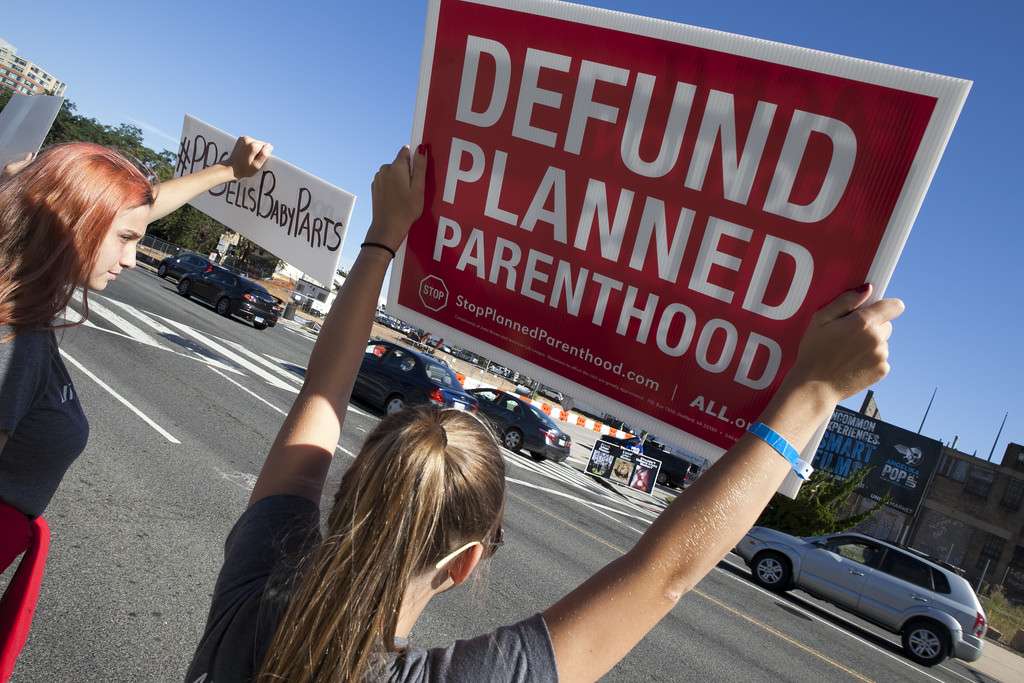5 Major Abortion Conflicts Brewing for 2016
The upcoming year promises to be a big one for reproductive-liberty issues. Here are five major conflicts to keep an eye on.


The U.S. abortion rate is at a record low, support for legal abortion at the highest point in decades, and federal courts have repeatedly struck down state rules that substantially infringe on abortion access. Nonetheless, Republican lawmakers across the country keep introducing new versions of the same old anti-abortion laws—providing ample fodder for yet more legal challenges. With the U.S. Supreme Court scheduled to hear one of these challenges in March, and presidential campaign season kicking into full swing, 2016 promises—for better or worse—to be a big year for reproductive-freedom issues. Here are five major conflicts to keep an eye on in 2016:
1. TRAP Laws Go to Washington
The Supreme Court this year will rule on whether Texas can enforce two regulations which would force about 75 percent of the state's abortion clinics to close. Both rules were passed in 2013 as part of an omnibus anti-abortion bill. The first stipulates that all abortion clinics must meet the same building standards as ambulatory surgical centers, even if no surgeries are actually performed there. The second says abortion doctors must have admitting privileges at a nearby hospital. The latter requirement, Republicans say, is essential in case complications arise.
But as with many such "targeted regulation of abortion provider" (TRAP) laws, these regulations serve no real medical purpose, as serious complications arising from abortion are exceedingly rare and—more importantly—someone experiencing complications can seek treatment at a nearby hospital regardless of whether doctors there originally performed the surgical abortion or doled out the abortion pills. With no rational connection to the health and safety of those seeking abortions, opponents argue that the Texas rules are motivated by nothing more than ideology and represent an unconstitutional infringement on abortion access in the Lone Star state.
Indeed, federal courts ruling on similar requirements in Alabama, Wisconsin, and elsewhere—as well as lower courts considering the Texas measures—have agreed that they pose an undue burden with little to no logical benefit. However, the 5th Circuit Court of Appeals ruled oppositely in the Texas case, triggering its trip to the nation's highest court. Oral arguments for the case (Whole Woman's Health v. Cole) are scheduled for March 2, 2016.
The Center for Reproductive Rights, a nonprofit organization representing the plaintiff, is asking the Court to affirm its 1992 decision in Planned Parenthood v. Casey. In that case, the Court held that states cannot pass "unnecessary health regulations" that have the "purpose or effect of presenting a substantial obstacle to a woman seeking an abortion."
The Court will be tasked with deciding whether the Texas regulations are actually in women's best interest or whether they are simply attempts by anti-abortion legislators to regulate clinics out of business. But as the Los Angeles Times' David G. Savage notes, "in the background is a larger question about the nature of abortion rights set out in the Roe vs. Wade decision: Is it a constitutional right that trumps state regulations that may interfere with a woman's choice, or is it a limited right subject to restriction?"
2. Surrogacy Showdown
Last fall, 26-year-old Brittneyrose Torres catapulted herself into the culture war when she found out she was carrying triplets. The problem? They weren't biologically hers—Torres was serving as a surrogate. And the couple she had contracted with only wanted her to carry two of the fetuses to term.
But Torres refused to get an abortion, claiming they had agreed that she would only do so in a life-threatening situation. The biological parents say otherwise, claiming that their contract does give them the right to require Torres to abort. Torres offered to adopt the third child herself, but the parents were not satisfied, saying that carrying triplets would put all three at increased risk for health problems and developmental disabilities.
Torres told the New York Post that she came forward with her story after hearing about another American woman, Melissa Cook, who found herself in a similar situation. After refusing to abort the third fetus, Cook was threatened by the biological father with "loss of all benefits under the agreement, damages in relation to future care of the children [and] medical costs associated with any extraordinary care the children may need."
These situations seem destined for a legal showdown soon. But whatever happens, their stories are also likely to reverberate far beyond the individual circumstances, as they touch on two emotional and hotly contested issues and inspire alliances that blur traditional pro-choice/pro-life lines. With surrogacy only loosely regulated in many states, and no federal laws on the matter, the atmosphere is ripe for activists and politicians to use the situation to crack down on surrogacy more broadly—something some have long been itching to do. New York, for instance, is currently considering a complete ban on commercial surrogacy.
3. Crisis Pregnancy Center Speech
A California law concerned with so-called "crisis pregnancy centers" (CPC) is setting off a First Amendment battle in the Golden State. Legislators recently mandated that any place providing pregnancy-related services must post a sign in a "conspicuous place" informing visitors that "California has public programs that provide immediate free or low-cost access" for family planning, prenatal care, and abortion. Christian CPCs object that he message is inconsistent their religious beliefs.
Two centers—A Woman's Friend Pregnancy Resource Clinic of Marysville, California, and the Crisis Pregnancy Center of Northern California—have already filed a lawsuit against the state, with the help of the Pacific Justice Institute. They claim the law "unconstitutionally compels [them] to speak messages that they have not chosen, with which they do not agree, and that distract, and detract from, the messages they have chosen to speak. They are challenging the law as a violation of their right to freedom of speech and free exercise of religion.
4. Planned Parenthood Funding and Fetal Tissue Research

As 2015 legislative sessions drew to a close, lawmakers in more than a dozen states and in the federal government were pushing measures to "defund" Planned Parenthood. At the federal level, conservative lawmakers even threatened to shut down the government if Democrats didn't get on board with a defunding measure attached to a spending bill.
There are two main ways goverment money goes to Planned Parenthood: Medicaid reimbursements (which come from both federal and state funds) and Title X grants from the federal government. The vast majority of funding in the form of Medicaid payments. Many of the state defunding measures seek to end state Medicaid contracts with Planned Parenthood, meaning people covered by the low-income insurance program couldn't use their benefits for health care there.
And this is where things get tricky, because under federal Medicaid law patients are granted "freedom of choice" among qualified providers. This means patients can see any provider that accepts Medicaid unless the state (for reasons other than political or ideological animosity) establishes that the provider is unqualified. In October 2015, a federal judge temporarily blocked Alabama from from terminating its Medicaid contract with Planned Parenthood Southeast, after Republican Gov. Robert Bentley attempted to end the contract with the two Planned Parenthood clinics there but failed to provide a reason why.
If, of course, Planned Parenthood affiliates were found to have violated fetal-tissue donation laws, as alleged in a series of videos from the Center for Medical Progress, states would have a legitimate reason for canceling contracts. This is a big part of what's prompting the push for statehouse committee or health-agency investigations into fetal tissue practices.
But so far no one's been able to prove any wrongdoing. In Washington state—one of only two where Planned Parenthood clinics permit fetal tissue donation—a four-month investigation from the state attorney general found "no indication that procedures performed by Planned Parenthood are anything other than performance of a legally authorized medical procedure" nor that fetal tissue was procured for profit "rather than simply recovering costs." Investigations in Georgia, Indiana, Massachusetts and South Dakota also found no evidence of illegal activity.
A special Congressional committee—Republicans are calling it the Select Investigative Panel on Infant Lives, while Democrats have deemed it the Special Republican Committee to Attack Women's Health—is still scheduled to look into whether Planned Parenthood clinics comport with federal fetal-tissue guidelines in 2016. And House Republicans are also pushing a vote in early January on their latest defunding effort. "But after five years of fruitless legislative attacks," reports The New York Times, "the House vote next week is likely to be the last… until a Republican moves into the White House," a "remarkable [resignation] given the intensity that conservative lawmakers and advocacy groups brought to the issue last summer and fall."
Still, a Congressional ceasefire on the issue doesn't mean it won't be relevant in 2016. State legislators and governors are still pushing defunding and several legal battles are ongoing. On Thursday, a federal appeals court temporarily blocked Utah Republican Gov. Gary Herbert's effort to pull $275,000 in state contract with the Planned Parenthood Association of Utah filed a request for an emergency injunction. Planned Parenthood is also fighting funding cuts in Texas.
5. Kansas "Dismemberment Abortion" Ban
In April 2015, Kansas became the first state to ban abortions via "dilation and evacuation," or D and E, which is the safest and most common method of performing second-trimester abortions. The Center for Reproductive Rights challenged the law—described by National Right to Life president Carol Tobias as "what we hope will be many state laws banning dismemberment abortions," using the term state Republicans also used in the bill's title—on behalf of one of the state's three abortion provider. In June, a state court temporarily blocked the law from taking effect.
Now the matter rests with the state appeals court, which must decide whether the county judge acted properly by issuing the temporary injunction in June. But the broader issue before the court is whether the Kansas Constitution provides the same guarantee to privacy rights—including the right to an abortion—recognized by the U.S. Supreme Court.


Show Comments (92)